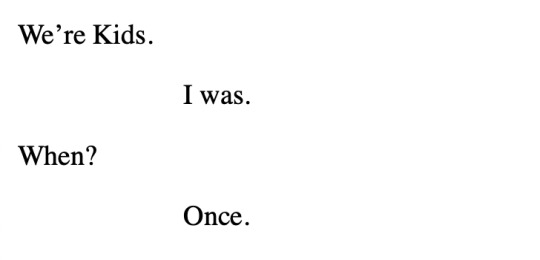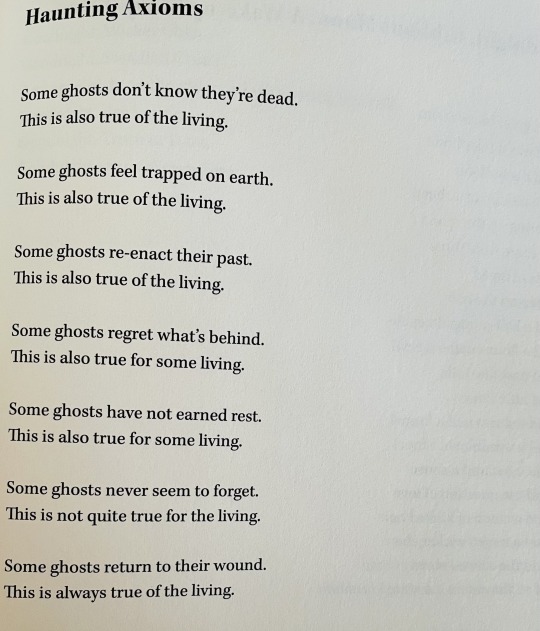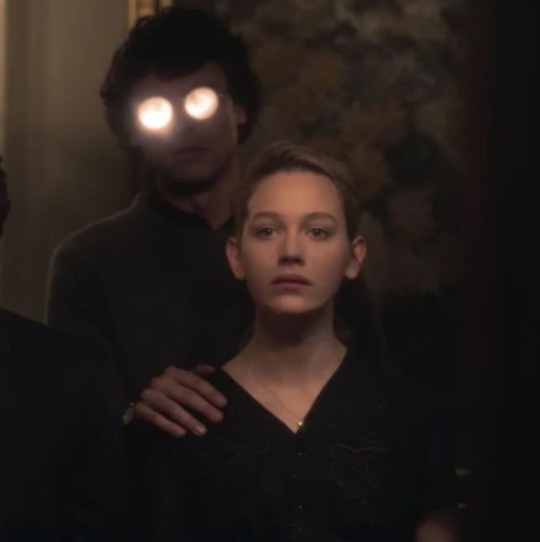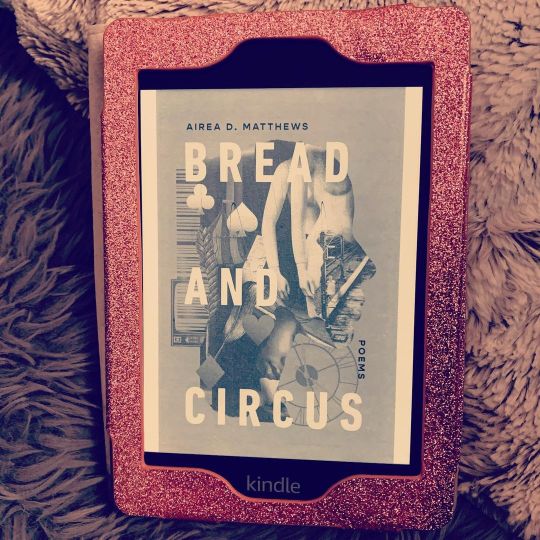#airea d. matthews
Text

Bread and Circus, Airea D. Matthews
66 notes
·
View notes
Text

Haunting Axioms
Some ghosts don't know they're dead.
This is also true of the living.
Some ghosts feel trapped on earth.
This is also true of the living.
Some ghosts re-enact their past.
This is also true of the living.
Some ghosts regret what's behind.
This is also true of some living.
Some ghosts have not earned rest.
This is also true for some living.
Some ghosts never seem to forget.
This is not quite true for the living.
Some ghosts return to their wound.
This is always true of the living.
—Airea D. Matthews, from Bread and Circus (Simon & Schuster, May 2023)
#poetry#airea d. matthews#ghosts#on life#on death#this fucking poem#bread and circus#recently read#typography
10 notes
·
View notes
Text
His Eye on The Sparrow
Airea D. Matthews
-after hanif
I guess black people can write about flowers at a time like this since every
poem turns on itself. Starts one way to end another. We see
it in nature too. How seed turns to
leaf regardless of its earth or the thought inside my head
blossoms into a hyacinth with as sweet a scent. Even in dreams,
thought’s pretend cousin, I often see Mamie Till. She walks the
church aisle toward her son’s body while wisteria bloats the casket’s brim and
papered bougainvillea bracts emerge from where his eye once was. An
entire garden from the nutrients of once human. And not to mention all
those awed birds that circle Emmett’s pillowed corpse. So many in
the tabernacle. Not predators of the fleshly bloom or harbingers of his
God’s descent, not refugees fleeing his body exilic but eternity’s
messengers. We, who pull breath, confuse death’s irony. Whoever dies and is
remembered stays living.
2 notes
·
View notes
Text









Fear Street part 3: 1666 (2021), Leigh Janiak//“Memory I.”, George Seferis//Rosario Castellanos//Piri, Dreamcatcher//“Select passages from The Holy Writ of Us,” from Simulacra, Airea D. Matthews//Remote Sympathy, Catherine Chidgey//The Haunting of Hill House (2018), Mike Flanagan//The Haunting of Bly Manor (2020), Mike Flanagan
#web weaving#mine#quotes#words#poetry#ghost#ghosts#haunted#thobm#thohh#the haunting series#mike flanagan#the haunting of bly manor#the haunting of hill house#dani clayton#nell crain#fear street#leigh janiak#fear street part 3: 1666#sarah fier#deena johnson#dreamcatcher#george seferis#rosario castellanos#catherine chidgey#october#halloween#airea d matthews#memory#memories
183 notes
·
View notes
Text
Patterflash is a Summer 2023 Poetry Book Society Recommendation. I'm so thrilled to hear this great news. The book releases on 1 June 2023, and now we can add "PBS Recommendation" to the cover.
#awards#recommendations#poetry#poetrybooksociety#PBSrecommendation#Poetry Book Society#Polari#writers and poets#black poetry#queer poetry#northern england#leeds#Manchester#canal street#gay village#Manchester gay village#millennials#genderfluid#nonbinary#gay men#gay poetry#mixed race#Mixed race writers
2 notes
·
View notes
Text
Antonio Velardo shares: The Magical Space Where Fun Is Every Child’s Birthright by Adrian Eli René and Airea D. Matthews
By Adrian Eli René and Airea D. Matthews
For kids in Philadelphia, the city’s recreation centers open a world of possibilities.
Published: August 2, 2023 at 05:01AM
from NYT Opinion https://ift.tt/o07sl2K
via IFTTT

View On WordPress
0 notes
Photo

#NetGalleyBookReview #BreadandCircus @aireadeefam Bread and Circus by Airea D. Matthews shows a collection of poems and prose as a memoir, story, and other things. It showed these collections from the past to the present. Airea wrote some that show how her and her family’s life going through. Thanks to the publishers and #netgalley for giving me an opportunity to read this book. https://www.instagram.com/p/CqBp7V5P_oI/?igshid=NGJjMDIxMWI=
1 note
·
View note
Note
8 and 32 for the weird writing asks?
8. If you had to write an entire story without either action or dialogue, which would you choose and how would it go?
Without dialogue. I've written scenes like this before so a longer story probably wouldn't be too difficult. But without action sounds fun but also very challenging.
32. What is a line from a poem/novel/fanfic etc that you return to from time and time again? How did you find it? What does it mean to you?
This took longer for me to think of since most of the quotes living in my head are from KH and I wanted to share something else.
"As proof that defiant bodies exist in theory, I even offer / what key evidence I have: my life and Mercury’s swift orbits, or / two planets in chronic retrograde, searching for sun’s shadow."
This is from the poem Descent of the Composer by Airea D. Matthews. I found it while taking a writing class a few years ago and it's always stuck with me. I love space and astronomy imagery, which this poem has a lot of, and the the repetitive form of the poem is very fascinating. I like these lines because of the metaphor of a person's life as something similar to a planet's orbit, or that the orbit is actually "chronic retrograde", moving but always in reverse. They play really well with other lines because of the form, so I recommend reading the whole poem.
0 notes
Quote
Imagine three days of God / gone missing. Now, / imagine my lifetime of it.
— Airea D. Matthews, from “Sexton Texts a Backslider after Breaking Lent,” Simulacra
#quote#Airea D. Matthews#poetry#Simulacra#out of my collection#Sexton Texts a Backslider after Breaking Lent
2K notes
·
View notes
Quote
I don’t like to be told what to do, and poems are very bossy.
Airea D. Matthews, interviewed by Kaveh Akbar for divedapper
31 notes
·
View notes
Text
Left of the sun disk on the dresser, I retire
the heirloom eye, place my ankh in a desert
diorama, a gift from some warrior's child. Hang
my lion's head on a gold-gilt wall mount, she casts
wild shadows on the ceiling—habit of insomnia.
When away from battlefields, simple deceits
pacify my full-blaze feral ego. Something vapid
to calm and divert attention from all those
warm rebels left alive. The fiercest
warriors know when to turn their backs.
I ignore fiction's mercies to wash
my real face, the one that knows of rivers
and smolder. Sure to splash water in both
eyes to smother the fires. Smoke replaces
iris and my blindness returns.
Standing straight before the vanity as if I can
see myself clearly. Here is where I'm hungry
skull, surging electric blue. Forced to raise
my unpainted face for a muddy flag and slake
my thirst with my own long, hard swallow.
A moment to consider the slow feast I've become
—offering famine and too much—to leeches
who have let my blood, including one
whose jawpinch I inherited. Such famished ghosts
can never be full, even after breaking fasts.
Each night a headlong stumble into glass that looks
just like me if I were not meant to rise before dawn.
Count the new shards in my hair, callouses under
brass rings; reminders of my hand to the miner's
ax and two sooty canaries left orphans to light.
The lion's head roars, side eyes my image
hoping not to face another of our undoings.
Shadows move, a mourner's bench.
Sekhmet After Hours by Airea D. Matthews
0 notes
Text
“Descent of the Composer,” Airea D. Matthews
When I mention the ravages of now, I mean to say, then.
I mean to say the rough-hewn edges of time and space,
a continuum that folds back on itself in furtive attempts
to witness what was, what is, and what will be. But what
I actually mean is that time and space have rough-hewn edges.
Do I know this for sure? No, I’m no astrophysicist. I have yet
to witness what was, what is, and what will be. But what
I do know, I know well: bodies defying spatial constraint.
Do I know this for sure? No, I’m no scientist. I have yet
to prove that defiant bodies even exist as a theory; I offer
what I know. I know damn well my body craves the past tense,
a planet in chronic retrograde, searching for sun’s shadow.
As proof that defiant bodies exist in theory, I even offer
what key evidence I have: my life and Mercury’s swift orbits, or
two planets in chronic retrograde, searching for sun’s shadow.
Which is to say, two objects willfully disappearing from present view.
Perhaps life is nothing more than swift solar orbits, or dual
folds along a continuum that collapse the end and the beginning,
which implies people can move in reverse, will their own vanishing;
or at least relive the ravages of then—right here, right now.
6 notes
·
View notes
Link
We are launching the Spring-Summer issue of American Poets tomorrow at Housing Works Bookstore Cafe. Don't miss readings by Airea D. Matthews, Nathan McClain, and this year's winner of the Walt Whitman Award, Jenny Xie.
#American Poets#Academy of American Poets#POETSorg#Walt Whitman Award#Jenny Xie#Airea D. Matthews#Nathan McLain#Housing Works Bookstore#SoHo#NYC#poetry#poems
9 notes
·
View notes
Quote
In Plato’s Republic, there’s a reason Socrates kicked out Homer and the other poets. You don’t banish the silent and powerless. Poetry, at its core, has the ability to expose the deepest and most inaccessible realities of the individual human experience. That fact alone makes its use of language a mighty form of illumination and resistance.
Airea D. Matthews
29 notes
·
View notes
Text
NO FEE Poetry Book Contest, $250 Prize - Broken River Prize (Platypus Press), DEADLINE: July 31, 2020
NO FEE Poetry Book Contest, $250 Prize – Broken River Prize (Platypus Press), DEADLINE: July 31, 2020
Every once in a while a new press with new ideas and amazing projects appears on the literary scene. Platypus Pressis one of those. I’ve been nothing but impressed with their creativity and professionalism. They are a boutique publisher based in England and seek to unearth innovative contemporary poetry and prose from a broad variety of voices and experiences. They are currently accepting no fee…
View On WordPress
#Airea D. Matthews.#Broken River Prize#free poetry chapbook contest#Michelle Tudor editor#Platypus Press
1 note
·
View note
Text
the bugs of our Dirty Computers
youtube
On April 27, when many were flocking to the theaters for Avengers: Infinity Wars, I was in 2nd floor Kohlberg with two other friends, screening Janelle Monae’s long awaited Emotional Picture, Dirty Computer. The masterpiece is a fifty minute sci-fi film about a woman resisting an dystopian futuristic government to avoid its erasure of her memory. Jane searches for her romantic interest Zen (played by Tessa Thompson), and each music video in the film represents one of her missing memories. It’s an instant classic, an entire album and movie dedicated to black queer anthems that sets a real bar in the historical production of Afrofuturistic films.
I preface my response with this because Dirty Computer’s allegory of bugs and viruses (10:35 in the video) weighed heavily in my reading of Airea D. Matthews’ Simulacre. In her poems, you can occasionally hear the buzz of wings, sense the crawl of feathery legs up a spine — not at all unsettling for entomology enthusiasts, which I am fortunately not. A spider “eye[s] dinner, sharpen[s] its knife claw,” while “waning dragonflies [are] sprawled and spent on gravel purged of fire” (6; “An Ingenue Texts Sexton Before the Honey Moon,” 24). Ants with errands scurry in a line, and roaches are caught under heels (“Quiet Desperation Texts Sexton on Independence Day,” 41; “If My Late Grandmother were Gertrude Stein,” 52). Though bugs are thankfully never the central subject of a poem, their singular existence seem to writhe out from within the body; Matthews’ first poem “Rebel Prelude” asks, “How did that parasite get inside?” and to my horror, specifies larvae (5). “Woman, creep,” a poem later states — or commands as it compares women to “roaches in the crawl,” as insignificant yet remarkably enduring creatures (52). Likening people to bugs is often more than not dehumanizing, I’d say, but Simulacre imbues this identification with an air of persistence, evolutionary instinct that stems from constantly being brushed to the side, trampled on, and killed for the sake of sanitation.
But I was more invested in the second definition of ‘bug’ that the book’s scientific allusions about DNA inevitably evoked — the viruses, the cracks in the system we all try to shake out of the computers we call minds. In the “Rebel Opera,” a mother pathologizes the virus when she states, “He’s sick, you know?” Her daughter’s reply implies the disease's omnipresence, its inescapability, its unavoidable allusion to the AIDs endemic: “That virus? The one carried in fluids? We’ll get it too! ” (30). To her, it is a virus as everyday as rain, a reality that deluges us all, a presence plain yet evocative washed away because of the discomfit it has always presented to the status quo (30). The narrator in Simulacre becomes a bugged computer, and like Jane in Dirty Computer, she asks herself, “Can a machine be lonely? (“Can (From Wittgenstein’s Lost Black Book), 48). Bugs are meant to be reprogrammed, fixed, cleaned, but what if it’s a bug she can never fully swat away? What if the virus is part of her CPU, caught in the net of the constant uploading, downloading, transmitting of information? What if the so-called bug is a feature, inextricably snared to the user’s existence?
She knows the “bug” in her is “a winged thing, a puncture, a black and wicked door,” an entrance-exit that has “jaws without hinges [in which] want moves between or up or down or through” (30, "Rebel Opera"). “Want’s in the DNA,” her mother plainly states and by that act, queer-codes bug, turns it into a metaphor for desires that refuse to be swatted away (5). “You can’t fight the code,” the daughter ponders, “can we fight DNA?” (17). How do we persist in a society that constantly tries to spray us away, cleanse us, tells us it behooves us to reprogram, deprogram? Do we accept our own bugs and viruses, or do we choose to resist the whole notion? The book hums with such invitation to pestering yet pressing inquiry.
#Dirty Computer#Janelle Monae#poetry#feminism#Afrofuturism#womanism#lgbtqia+#queer women of color#queerness#bugs#DNA#virus#Simulacre#Airea D. Matthews#who gives a rat's ass about Avengers when Janelle Monae released her Emotion Picture in the morning#conformity#sanitization#cowopo#ENGL 048
0 notes